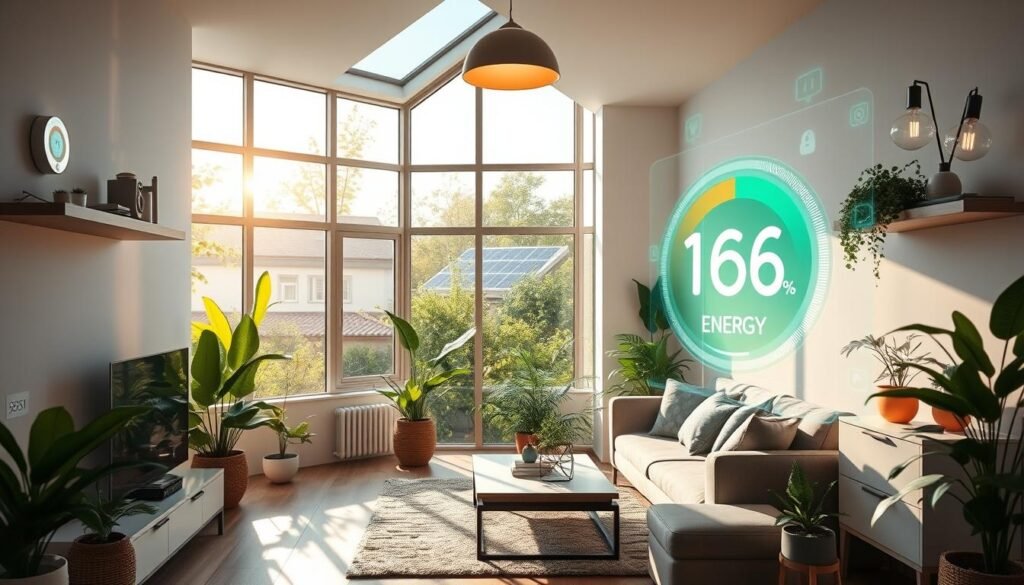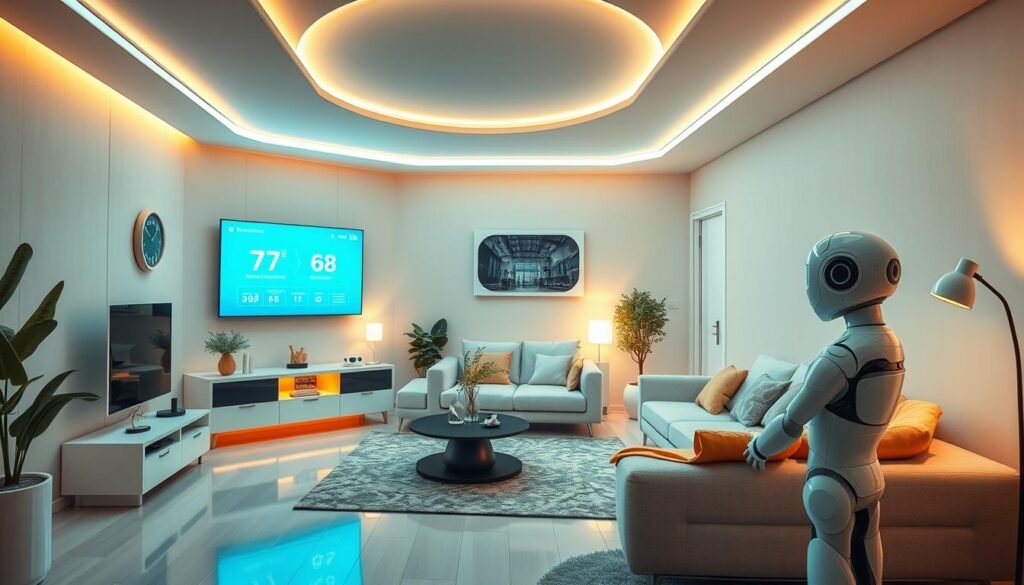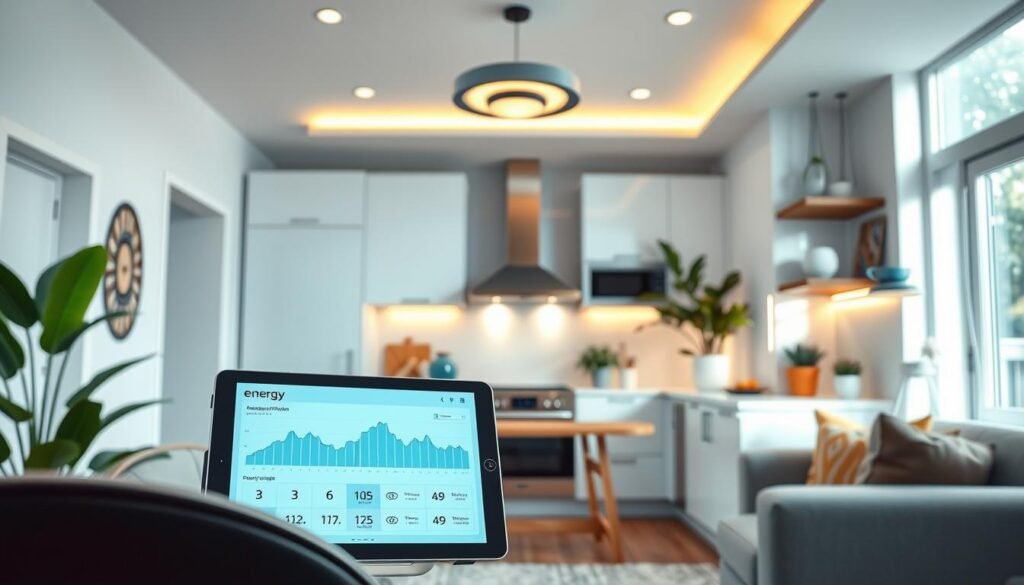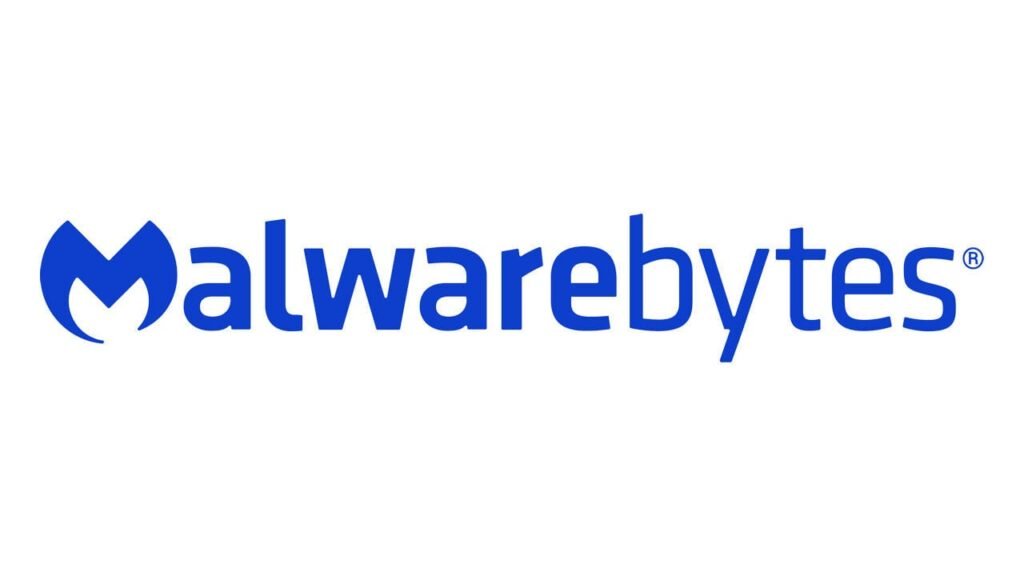Did you know the smart home industry is set to hit $174 billion by 2025? As energy needs grow and the planet suffers, using AI for smart home energy is key. AI can change how you manage energy, making your home more efficient and green. Smart home tech cuts energy use and shows you how you use it.
AI tools can make your home use less energy without losing comfort. For instance, AI lights learn your habits to save energy1. Smart thermostats also adjust based on what you like, saving energy when you're not home or asleep2. With these techs, saving energy can also save you money over time.
Using these technologies makes your life better and helps the planet. So, let's see how AI can help save energy in your home and make it a greener place.
Key Takeaways
- • AI technologies can significantly enhance energy management in smart homes.
- • Energy-efficient tech aids in reducing overall energy consumption while increasing comfort.
- • Smart thermostats and lighting systems adapt to your routines for optimal efficiency.
- • Implementing AI solutions can lead to meaningful cost savings on utility bills.
- • AI can provide personalized insights and recommendations for better energy usage.
Understanding Smart Home Energy Management
Smart home energy management uses advanced tech to watch and control your home's energy use. It uses connected devices, smart meters, and smart algorithms. These home automation systems help save energy and are good for the planet. Knowing how much energy you use is key to getting the most out of these systems.
Adding AI to these systems makes managing energy smarter. For example, smart thermostats save energy by changing the temperature based on when you're home. This can cut heating and cooling costs by over 20%3. Smart lights also save energy by turning off when no one is in the room and adjusting brightness based on daylight3.
Smart appliances use eco-modes to use less energy, like electricity and water, based on how much you need3. Smart power strips also help by cutting down on energy used by devices when they're turned off3. With real-time data from smart energy systems, you can understand your energy use better. This helps you use energy more efficiently.
Using smart tech makes your home smarter and more eco-friendly. By adding AI to your home's energy management, you can predict and adjust energy use. This helps manage energy better during busy times4. This approach fits well with the goal of net-zero homes, where energy use equals or is less than what's made on-site4.
In short, getting to know smart home energy management makes your home more energy-efficient. It lets you play a big role in saving energy and saves you money too.
The Role of AI in Energy Conservation
AI is key in making homes smart and saving energy. It uses data from devices to predict energy use. This helps homeowners save energy before it's needed.
In the EU, buildings use nearly 40% of energy and cause 36% of greenhouse gas emissions. This shows how important smart energy solutions are5.
Using AI in homes has its challenges. There are worries about privacy and too much data. But, AI's benefits are huge, like saving energy in heating, lighting, and cooling systems.
JLL’s Hank platform cut energy use by 20% by improving HVAC systems6. AI can also design systems that use less energy when not needed.
AI finds ways to save energy and cut costs. It helps follow building codes, encouraging energy-saving habits5.
AI can change how we use energy in buildings. It's important for homes and businesses. Using AI can save money and help the planet.
| AI Application | Benefits | Challenges |
|---|---|---|
| Energy Monitoring | Predict usage patterns and optimize energy consumption. | Data privacy and overload concerns. |
| HVAC Optimization | Reduce consumption by enhancing heating and cooling efficiency. | Initial implementation costs. |
| Predictive Analytics | Enhance resource allocation and prevent energy wastage. | Skill gaps and maintenance of AI systems. |
| Dynamic Adjustment | Adjust settings based on real-time occupancy data. | Integration with existing systems. |
How AI Helps Reduce Energy Consumption in Smart Homes
Understanding how AI cuts down energy use is key for homeowners. Smart homes with AI systems save money and help the planet7. These systems can also predict when appliances need maintenance, making them last longer and use less energy7.
AI learns your energy habits and suggests the best times to use appliances. For example, Silicon Labs' sleep mode cuts power use by over 90% when you're not using devices8. It also saves up to 80% of energy costs when you're away on vacation8.
AI makes homes more energy-efficient by adjusting lights and temperature based on your preferences7. Without sleep mode, devices use a lot of power. But with it, they use much less, saving a lot of energy over time8. The EU Ecodesign Regulation 2023/826 also supports this technology, making homes more energy-smart8.
AI also improves smart lighting by using sensors to detect movement and light9. It makes sure important appliances work during energy crises, saving the power grid. This smart energy management saves money now and helps the planet in the long run9.

Smart Home Automation: Integration with AI
Smart home automation is changing how we live by using AI. It makes our homes work better together. Devices like thermostats and lights talk to each other to save energy. This lets you control things like lights and temperature with just a few clicks.
Numbers show how big this change is. The AI in Smart Home Technology Market was worth about $11 billion in 2022. It's expected to hit $52 billion by 203010. This growth is because AI helps homes use less energy, saving money and the planet.
AI also makes homes work better by fixing problems before they start. It uses learning to know what you like and need. This makes your home more comfortable and reliable.
As AI gets better, so does energy management in smart homes11. This leads to big energy savings and a greener home. In short, AI and smart homes are getting better together, making life easier and more sustainable.

Intelligent Thermostats for Maximum Efficiency
Intelligent thermostats are key to saving energy in smart homes. They use advanced tech to better manage your home's heat and cool. This makes your home more comfortable and energy-efficient.
Learning Your Patterns
One great feature of smart thermostat features is learning your temperature likes. The Nest Learning Thermostat, introduced in the early 2000s, is a leader in this area12. It gets to know your habits and adjusts to save energy12.
These thermostats also cut down on energy use. They change heating and cooling based on when you're home and the weather12. Remember, heating and cooling can cost over $900 a year for many families13.
Remote Management Features
Remote management lets you control your home's temperature from anywhere. This means you can save energy even when you're not there. Thermostats with geofencing turn down the heat when you leave, saving energy13.
ENERGY STAR certified devices also get updates to save more energy13. For the best results, put your smart thermostat near your router13.

Appliance Optimization Using AI Technologies
In today's smart homes, making appliances work better is key to saving energy. Homeowners can use AI to control how much energy they use and make their devices last longer.
Identifying Energy-Hogging Devices
AI is great at finding out which devices use a lot of energy. Smart systems use data to watch how appliances work and how much energy they use. For example, LG’s ThinQ technology uses sensors to check how well appliances are working. It can even guess when they might need fixing, helping you avoid big repair bills14.
Automated Schedules for Appliances
Setting up schedules for appliances is another big way to save energy. AI can make sure appliances only run when it's cheapest and when you're home15. This means you can save money and help the planet by using less energy. AI can also predict when appliances might break down, so they work better without stopping too often14.
| Appliance | Energy Usage (kWh) | Optimal Schedule (Off-Peak) |
|---|---|---|
| Washing Machine | 1.5 | 9 PM – 7 AM |
| Dishwasher | 2.0 | 10 PM – 6 AM |
| HVAC System | 3.0 | 9 PM – 6 AM |
| Refrigerator | 1.2 | Constant |
Using these technologies can help you save energy and make your appliances more reliable.
Energy-Efficient Lighting Solutions
Homeowners are now choosing smart lighting systems for their energy-saving benefits. These systems use LED technology to adjust lighting based on natural light and occupancy. This means lights only turn on when needed, cutting down on energy waste and boosting efficiency16.
LED bulbs, a key part of these systems, last much longer than old bulbs. They can last up to 25 times longer, saving you money on energy and replacement costs. This makes your home more eco-friendly17.
Smart lighting systems also help you track your energy use. This lets you see how much energy you're using and make changes to save more16. When paired with smart thermostats and blinds, they can even adjust based on how many people are home and the weather. This can lead to big savings on your utility bills17.
Modern smart lights can change colors and brightness to match your mood or activity. They can also learn your habits and adjust lighting for you, making your home feel more personalized18.
These systems use sensors to turn off lights when no one is around. This cuts down on energy use and makes a big difference in your home's energy efficiency16. By using smart lighting, you can save energy and help the planet, making your home more sustainable17.
Renewable Energy Integration: AI's Impact
In today's world, using renewable energy like solar in smart homes is key. Artificial intelligence (AI) is crucial in this shift. It helps make solar panels and battery storage systems work better together. This means you get more out of clean energy.
Using less of the electrical grid and more clean energy is good for the planet. It helps make your home more eco-friendly.
Global renewable energy capacity grew by 7.4% in 2020, says the International Renewable Energy Agency (IRENA)19. AI is set to make big moves in this area. The AI market for clean energy is expected to hit over $75.82 billion by 203019.
AI makes energy use more efficient and the grid more stable. It also helps lower costs. This shows how AI can help in many ways.
AI and renewable energy work together well. They help with energy forecasting and managing the grid. They also support decentralized energy systems19.
With AI getting better and working with new tech like IoT and blockchain, the future looks bright. Using AI for energy can make your home greener and more efficient.




